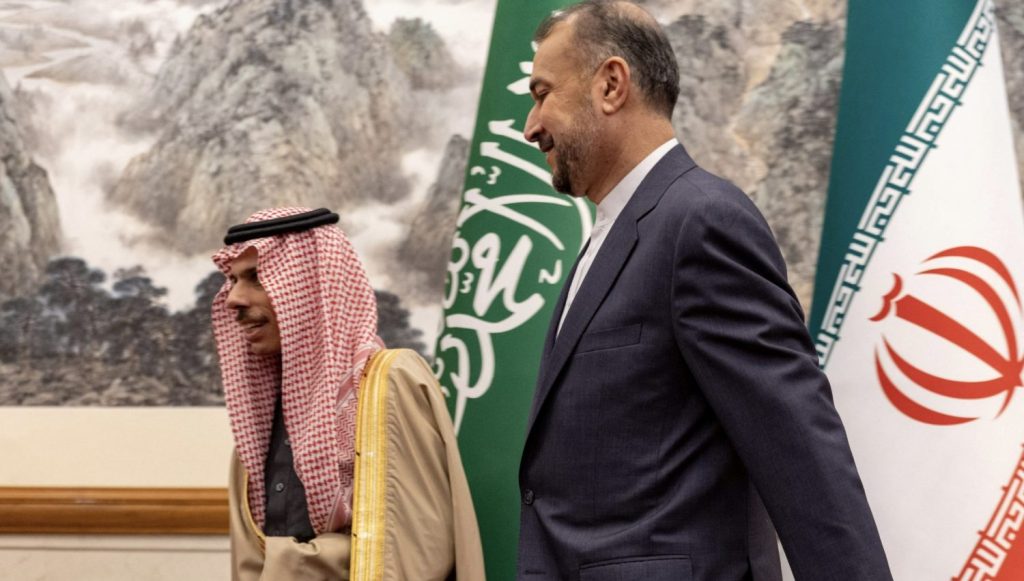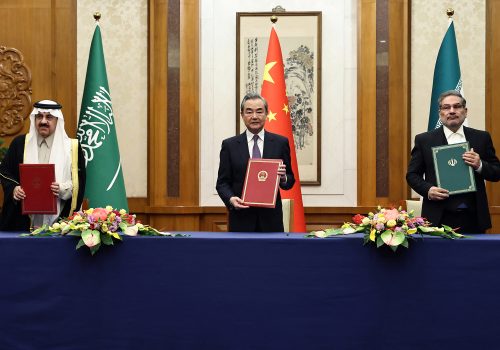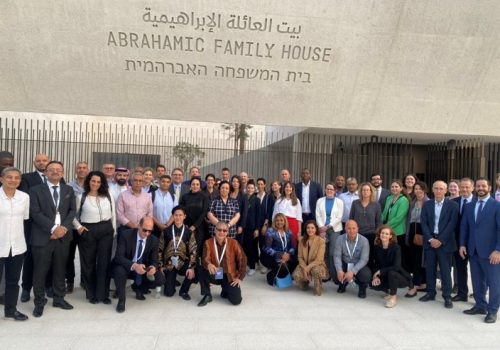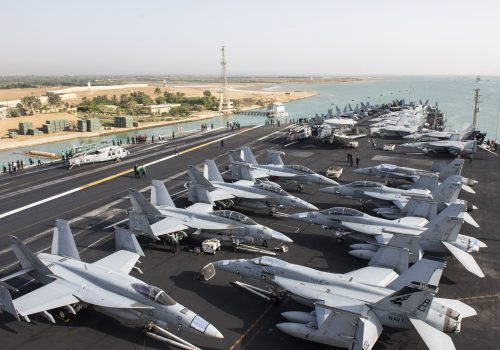Israeli-Arab normalization, which was stalled for decades, picked up momentum following the 2020 Abraham Accords. At the same time, this push for normalization from leaders has been inextricably linked with an ideological doctrine juxtaposing Arabs and Iranians as predestined regional antagonists. Whether out of necessity or opportunity, there has been pressure on Arabs to redefine their historical enemy from Israel to the Islamic Republic of Iran. That is, until now. The recent rapprochement between Saudi Arabia and Iran, combined with reports that Riyadh is demanding exceedingly steep concessions by the United States to move forward with normalization, could signal a sea change in Arab-Iranian relations and pose practical hindrances to Arab-Israeli normalization.
It is important to ground the recent Iran-Saudi reconciliation in its historical context. Nations are first formulated at the imaginary level defining one’s national identity in opposition to external powers and enemies, as posited by Benedict Anderson’s Imagined Communities. The Arab nation, the Ummah, is no exception. Going back millennia, the term ‘arab was presented in opposition to the ‘ajam, meaning those who do not speak Arabic and referring specifically to their Persian neighbors. Mesopotamian battles against the Achaemenids and folktales of the resistance of Al-Hirah, the capital of the Lakhmid kingdom, against the Sasanian Empire cemented that perception in Arab memory and oral traditions.
Since the Islamic revolution of 1979, a mounting anti-Persian sentiment recaptured the region. It was fueled by the Shia-Sunni schism and a fear Iran would export Ayatollah Ruhollah Khomeini’s theocratic Shia model to the young neighboring Arab states. This animosity resulted in confrontations starting with the costly Iraq-Iran war of 1980 and the more recent proxy battles in Yemen, Lebanon, and Syria. Although geographical proximity made ongoing trade relations between Gulf countries and Iran a necessity, Arab sentiment toward Iran remained negative. The United Arab Emirates (UAE), for example, is Iran’s second-largest trade partner, with $14.28 billion in commodities traded in 2021, while also being one of its fiercest foes over long-running territorial disputes.
A number of forward-looking Arab countries evidently saw an alliance with Israel as a pressing necessity to face growing Iranian nuclear and geostrategic ambitions. This doctrine could be described as an application of a tribal Arab proverb, “Me and my brother against our cousin, and me and my cousin against the outside.” The perception was a main driver of several Arab countries signing on to the Abraham Accords, brokered by the United States in 2020. Discursively and politically, the peace agreement preaches greater affinities between Muslims and Jews, Semitic cousins and descendants of the patriarch Abraham. In practice, however, it also presses for both to put aside their differences to isolate further the Safavid ‘ajams, who are accused of spreading their “deviant” doctrine and destabilizing the region.
Now the pendulum is swinging the other way. In March, Saudi and Iranian officials agreeded to restore diplomatic ties. The weeks since have seen movement on a range of long-stuck issues from Yemen to energy. Just this week, the Wall Street Journal reported that Saudi leaders are discussing renewing ties with Iran-backed Hamas. While still early days, this Saudi-Iran rapprochement has distorted the “redefining the enemy” ideology regarding Israel and is blowing serious winds in the direction of the Abraham Accords. The influence of Saudi Arabia on current signatories of the accords, especially those with vested financial and strategic interests in the kingdom, is not to be underestimated. One can even speculate that countries such as Egypt, Bahrain, and Morocco might follow Saudi Arabia’s lead and work toward improving relations with Iran. Morocco and Jordan, for example, rely heavily on Saudi military assistance, while the Egyptian economy is becoming increasingly dependent on Saudi and Gulf aid.
Amid the growing rivalry between the UAE and Saudi Arabia and a silent crisis building up between the two Gulf Cooperation Council countries over leadership in the Gulf, the UAE must have felt blindsided by the Saudi restoration of diplomatic ties with Iran. The UAE might now be considering ways to cut a better deal with Israel and the United States in exchange for further normalization, given that Saudi Crown Prince Mohammed Bin Salman reportedly raised the stakes by asking for the kingdom’s own nuclear program in exchange for normalizing relations with Israel.
Similarly, Morocco is cooling down its commitments to the Negev Summit and focusing exclusively on military and industrial exchanges with Israel, as Rabat’s political circles see the United States and Israel hesitating to recognize Morocco’s claims over Western Sahara. In retaliation to this ambiguity, Morocco is allegedly postponing the next Negev Summit, which was supposed to take place on its soil, and asking for further guarantees. The approach is reflective of the predominantly transactional mindset behind the accords, mediated by then US President Donald Trump and his son-in-law.
While there has not yet been a formal reversal, the normalization process itself may also not be mature enough to withstand a prolonged stasis. It already faces an informal chipping away due to recent actions by Israel, including the storming of holy Islamic places of worship during Ramadan and other recent provocations. For example, an Israeli minister recently claimed that “there is no such thing as Palestinian people.” Meanwhile, most Arab populations continue to cultivate an anti-Israel sentiment reinforced by years of pan-Arabist discourse and a justifiable affinity with Palestinians and their cause. As such, the right-leaning Netanyahu government is putting its Arab partners in a delicate situation where they need to appease public opinion without retracting from their international engagements with Israel and the United States. This dilemma, paired with the Saudi realignment, has resulted in a period of laxity among normalization countries. Israel, for its part, is turning its diplomatic attention beyond Arab countries to Azerbaijan and Turkmenistan, among others.
The United States is largely absent in this equation. Washington, which prompted the Abraham Accords, is increasingly disinterested in the Middle East and North Africa. Its resources and attention are focused on defeating Russia in Ukraine and countering China’s mounting global influence. Arab countries, meanwhile, are reevaluating their exclusive allegiance to the West as they anticipate a further decrease in US influence in the region and feel more alignment with Washington’s competitors, whose anti-hegemonic multipolar selling points sync better with their leaderships and populations alike.
Recent signs of progress on the Yemeni and Syrian fronts might indicate that Iran is serious in its reconciliation efforts with its Arab neighbors, yet Tehran’s record of regional proxies and tortuous negotiations tell another story. Iran might well be persuing a more tactical peace deal with Saudi Arabia to allow itself to overcome its internal crisis and economic hurdles before reverting back to its old ways. On the other hand, the odds of reenergizing the Abraham Accords once a more moderate government retakes the reins in Israel remains very plausible, especially given the enormous economic and military cooperation potential between Israel and its neighbors. That potential is evident in people-to-people forums such as the N7 initiative—which is co-sponsored by the Atlantic Council and the Jeffrey M. Talpins Foundation—where participants from Abraham Accords nations are eager to trade ideas on issues of common concern. Given these factors, Arab countries, if well-advised, might transcend the dichotomy of “either-or” and pursue a more pragmatic approach that balances interests with both Israel and Iran.
Meanwhile, the rhetoric upon which the Abraham Accords was built until now of portraying Iran as the primary enemy is shattering. Arab countries may indeed continue to warm up to Iran and China after Saudi Arabia’s deal and continue to lose patience with Israeli Prime Minister Benjamin Netanyahu’s problematic government and US President Joe Biden’s passive Middle East and North Africa policy. While normalization with Israel is an imperative for regional prosperity and progress, the prospects of such a monumental project will start losing momentum if the United States does not provide immediate incentives. Such insentives could include additional weapons deals, increased military aid and investment packages, and a more responsive policy to the territorial and security priorities of its Arab partners to keep them interested in normalization.
What is for sure is that it is easier for Arabs to put the Sassanid and Safavid invasions of Arabia behind them than the 1948 Nakba and the 1967 Six-Day War with Israel, which makes the redefinition of the enemy more perilous and the invention of a new friend more uncertain.
Sarah Zaaimi is the deputy director for communications at the Atlantic Council’s Rafik Hariri Center & Middle East programs.
Further reading
Fri, Mar 10, 2023
Why did China broker an Iran-Saudi detente?
Fast Thinking By
What does this move mean for one of the Middle East’s defining rivalries? How should the United States view China’s role in the breakthrough? Our experts dig beyond the diplomat-speak.
Fri, Mar 31, 2023
Israeli-Arab cooperation on agriculture, water, and food security starts with building on existing innovations
New Atlanticist By Daniel B. Shapiro
The recent N7 conference showed how the climate crisis in Middle Eastern societies has given rise to a set of issues around which there is much consensus and a true openness to addressing them together.
Tue, Mar 14, 2023
Improving Gulf security: A framework to enhance air, missile, and maritime defenses
Report By
Looking at decades of US support and operations in the Gulf and recognizing a continued, arguably growing, air and maritime threat from Iran, the Atlantic Council Gulf Security Task Force developed a framework on how to best protect US and allies’ interests in this sensitive, always relevant region.
Image: Iranian Foreign Minister Hossein Amir-Abdollahian meets with Saudi Arabia's Foreign Minister Prince Faisal bin Farhan Al Saud in Beijing, China, April 6, 2023.



